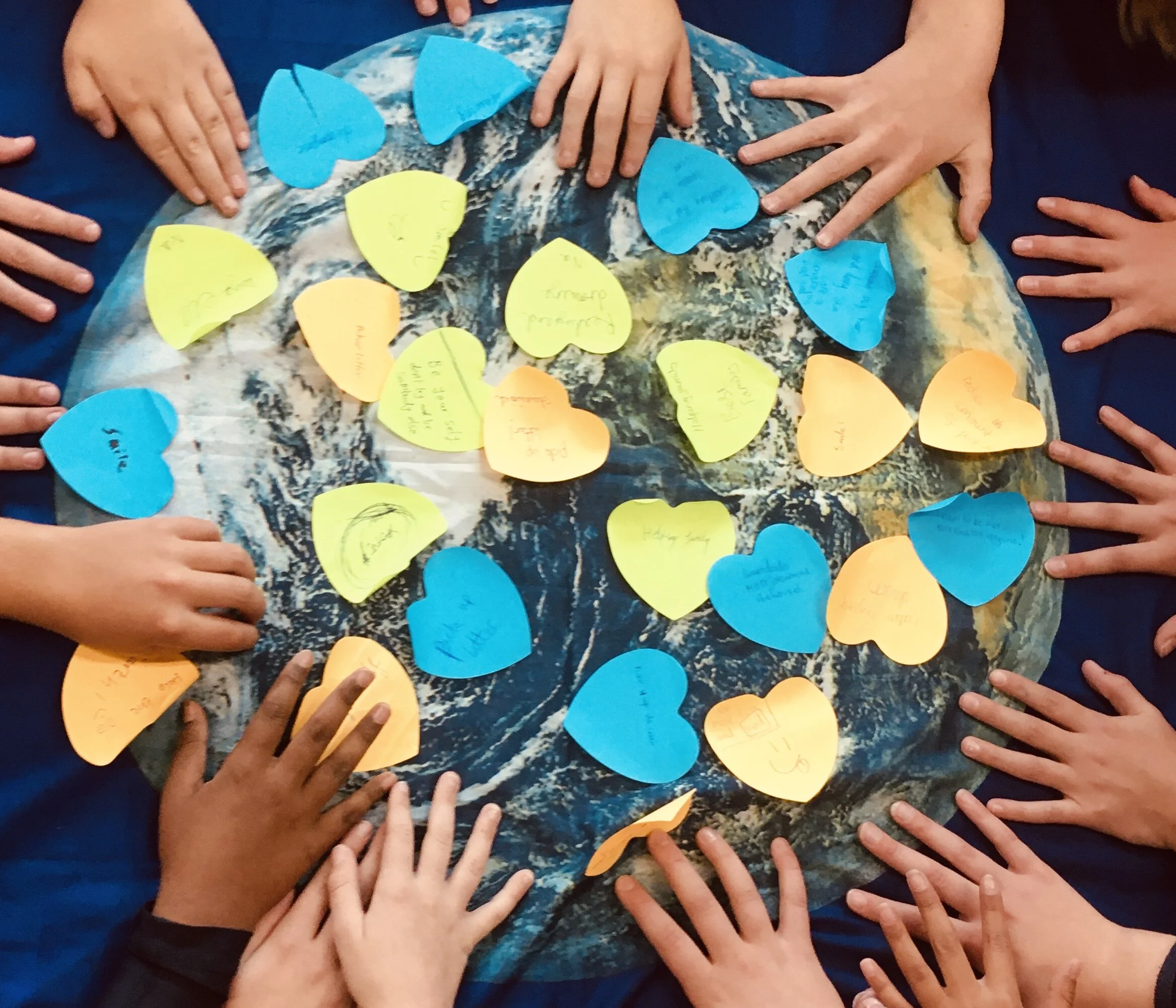Spreading seeds of happiness with the next generation!
This year has seen lots of changes and opportunities for reflection, and at the Museum it’s been no different.
One of the ‘lotuses’ from this year has been the re-awakened desire to alleviate mental health issues amongst children and young people.
We’re developing a whole new programme to meet this need and finding real joy in sharing the tools of happiness in schools, as our director Vicky Johnson explains
The inspiration
At the start of this year, I had the joy of teaching a group of 15 eleven-year-olds a short version of our Happiness Facilitator Programme. Their plan was to create a mini ‘Museum of Happiness’ in their school, to share their reflections and spread more happiness and peace amongst their fellow students and beyond!
Working with this school planted seeds of inspiration for the Museum of Happiness team. The thought of running our teacher-training programmes with children and empowering these future change-makers was enough to make our hearts burst with joy!
Whilst teaching at that school, another teacher from a school in Norwich attended the session and excitedly booked us to visit her school, too! We didn't realise at the time that these synchronicities were leading to a big shift in the focus of our social enterprise.
Because a few weeks later, the UK went into lockdown due to Covid-19. Everywhere across the world, humans were being forced to stop, pause and take time to slow down and reflect.
A time for reflection - and compassion
We were invited to reconnect with our families and to nature, and to honour the NHS and low-paid key workers - the unsung and unrecognised heroes who keep our entire society functioning. We were forced to tune into the suffering of humans, animals and the planet, with our interconnectivity becoming clearer than ever before.
There was a deep call for compassion for the world. Interestingly, the word Karuṇā (in both Sanskrit and Pali) is generally translated as compassion and self-compassion. Our beautiful friends at Service Space started a beautiful labour of love called Karuna Virus, helping all of us to respond with compassion and water seeds of hope despite our difficulties.
Whilst in lock-down I reflected on how the Museum could best serve to the world, beyond supporting our wonderful existing community. And the message that came through loud and clear was to work with the young people and to support schools at this tough time.
Why children and young people, and why now?
This feels particularly important as young people’s mental health challenges are at record highs and predicted to increase. According to the World Health Organisation, 1 in 5 adolescents may experience a mental health problem in any given year. 50% of mental health problems may be established by the age of 14, and 75% by the age of 24.
It’s clear that a new approach is needed, especially in the face of the new challenges we’re all facing. The Children’s Society’s Covid-19 Recovery briefing suggests that
".. the primary focus of the recovery curriculum should be on promoting well-being and successful reintegration, rather than solely focusing on academic achievement.
Adopting a whole school approach to mental health and wellbeing will be more important than ever."
So we feel it's incredibly important to work with the children and the next generation of change makers.
Putting it into practice
In September I had the joy of spending the day at the aforementioned Norwich school with 3 classes of eleven-year-olds (66 children in total). We did a mini version of our Happiness Facilitator Programme, where we explored how happiness is a skill that can be learnt, explored tools and techniques of mindfulness, compassion and gratitude, and how to truly be the change you wish to see in the world.
The session ended with each young person writing a pledge for greater happiness and peace both in themselves and in the world. One very wise boy said, ‘Isn't it the same though, as the more happy and peaceful we are as individuals, the more happy and peaceful the world will be?’ So true!
The teachers shared that it was so beautiful to see the children open up about their feelings and difficult emotions - particularly the boys and the more shy students. We re-imagined emotions as being ‘internal weather’, which the children then drew. And they were reminded that we are NOT our weather, we are the whole sky and the sky can hold all of it.
The amazing response!
It was really special to see how the children took to meditation and gratitude practices so easily - and one young girl was even moved to tears at the thought of how blessed she is!
Children from India have visited the Museum of Happiness in the past, and they brought with them some of their hand-made items. I always gift these beautiful creations when visiting schools, whilst sharing the children’s story of their Earn ‘n’ Learn scheme (which means they can pay the way for their own education).
The children were so struck that these children in India, who didn't have all the home comforts that they take for granted, had made them gifts! It really made the students reflect on all they had to be grateful for - so much so that when a student's parent was late in picking her up she got annoyed but then said, ‘ But I’m grateful to have a school to go to, and a father to pick me up - I know how lucky I am’!
The children were so wise and so in tune with all the teaching. They had so much to share, with heart-warming reflections that give so much hope for the future: to keep spreading kindness, to tend to their difficult emotions and not take them out on others, to be grateful for all that they have, and that when they feel sad or scared that they can practise mindful self-compassion to soothe themselves.
And the school’s teachers? They kept popping into the sessions, sharing that they were only supposed to stay for 5 mins, but ended up staying the full hour! They reflected that although they had a mountain of marking to do, learning the science of happiness and ways to best take care of themselves and others was the most important way they could spend their time.
So, what’s next?
The Museum of Happiness is so excited to shift its focus to working with schools and teachers, to support our next generation of inspiring young change-makers to make a difference in the world. We’re over the moon to be launching our 8-week Flourishing Schools Programme, where we’ll be running a specially-tailored version of our 6-week Happiness Facilitator programme with a peer-elected youth board and all the teachers.
The three core programme elements:
Plant Seeds
Launching the project in each year group, we’ll provide half a day’s training for teachers and children, creating the school’s Happiness Ambassador Board.
Nourish Seeds
Launching the Happier Mind experiment, you’ll learn the skills of mental well-being, gratitude, mindfulness and kindness, creating reflective displays/events to cement learnings. Learn how to ‘Water the flowers, not the weeds’ - Ajahn Brahm
Spread Seeds
Create your own mini Museum of Happiness! Showcase the science and learnings for parents and your whole school, catalysing further conversation and change.
Our pilot programme host - Queen’s Park Primary School!
We are so excited to be launching our first Flourishing Schools Programme at Queens Park Primary School in the New Year! They aim to “empower our pupils to believe in their capacity to make a change in the world... a change for the good”.
They put into action Nelson Mandela’s belief that “Education is the most powerful weapon which you can use to change the world”, and feel wellbeing is a crucial part of education.
The school is very diverse and has students that come from both wealthy and deprived households. They have a programme called Children's University where they provide experiential learning and new experiences for children living in deprivation, in order to grow their confidence and self esteem.
The school is so excited to partner with the Museum of Happiness and together we aim to understand how we can really make a difference in the education system, empower our next generation of change-makers, and nurture greater self-compassion and self-care in the teachers so they can keep serving from a full cup.
As Jon Kabat says ‘You can't stop the waves, but you can learn to surf’.
May we all equip ourselves with the tools and techniques we need to weather these storms and uncertain times.
May we make meaning from our difficulties and use them to help us access a deep call for compassion.
May we all continue to ‘water the flowers, not the weeds’ inside of us, as Ajahn Brahm says.
May we keep nourishing and spreading seeds of compassion, togetherness and hope for ourselves, our loved ones and for the world.
Because we can make it a happier, kinder world - together.


